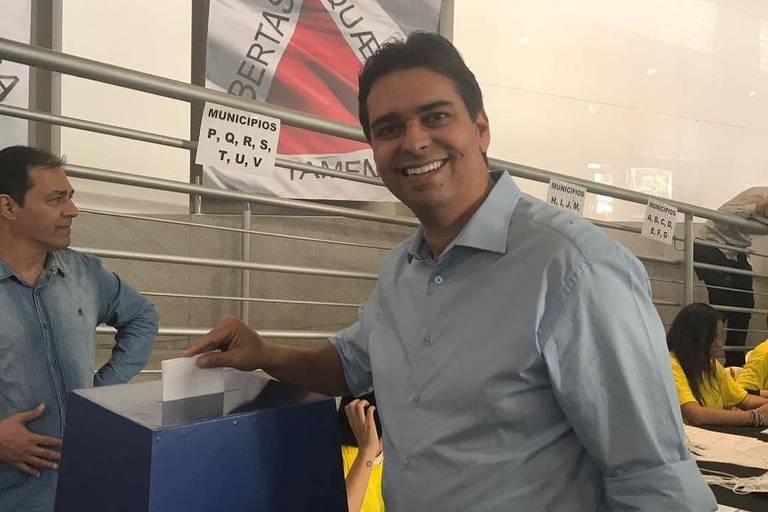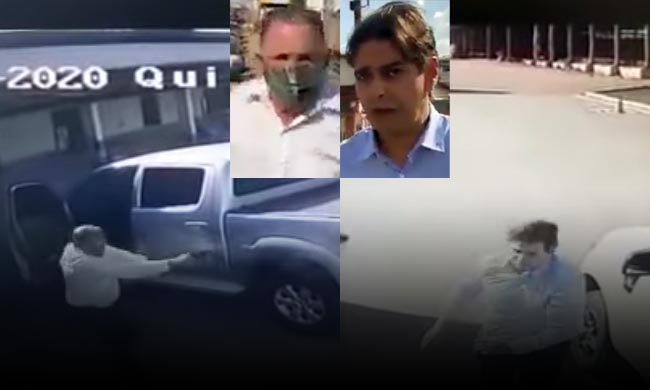RIO DE JANEIRO, BRAZIL – At around 3 PM on Thursday, September 24th, Cassio Remis, an attorney and PSDB candidate for city council in Patrocínio (Minas Gerais State), made a live stream on his Facebook page to denounce a work by the City Hall.
Half an hour later, Remis was murdered in broad daylight and on camera outside the Municipal Works Department by his own secretary, Jorge Marra, who is also the brother of the Mayor of the 90,000-inhabitants city in the Minas Gerais Triangle region.
The history of political rivalry is shocking for its tragic consequence, it brings ‘Colonelism’ into the digital age and causes concern over the forthcoming electoral period in a country where the debate of ideas has recently led to violent events.

The target of Remis’ real time denunciation was the Patrocínio City Hall, led since 2016 by the attorney’s political opponent, Deiró Marra (PSB). Both were candidates for city Mayor in the 2016 Municipal Elections, won by Marra with 48 percent of the vote. Remis came in last place among the five candidates, with only 3.74 percent of the vote. Marra was elected with 22,868 votes, while Remis got 1,756 votes.
One day after the city council candidate’s death, Cassio Remis’ Facebook page had over 19,000 followers. Despite the poor results in his attempt to become mayor, Remis’ political past, at 37 years of age, accredited him to seek the position. He was elected the youngest city councilor in the city’s history in 2008, when he was 25 years old, and served two terms until 2016 – he was Mayor between 2013 and 2014. The former city councilor was now seeking to retake City Hall with a speech critical of the current Mayor.
On his social media, he denounced City Hall measures related to the health crisis caused by the Covid-19 pandemic and the lack of resources for municipal daycare centers. Recently, with the slogan “corruption is living on borrowed time,” he described Marra as being convicted by the Electoral courts for “the practice of forbidden conduct within the municipality’s electoral process,” in the same video in which he accuses the Mayor of buying votes.
The accusation that led to Remis’ death was more specific, about a work performed by the City Hall on João Alves do Nascimento Avenue, downtown. According to the candidate, the city’s Municipal Works Department was using civil servants and equipment to renovate the sidewalk of a house that would be the location of Deiró Marra’s electoral committee for the reelection campaign.
“To our surprise, but not strangely, since yesterday we have seen an army of City Hall servants used to pave the sidewalk where the Mayor’s Electoral Committee is likely to be located,” Remis said on the live stream. A little over a minute after starting to record, he was interrupted by Jorge Marra, who came by car and grabbed Remis’ cell phone. “Now the secretary is coming to attack me” were the last words recorded by the candidate for city councilor.
According to police colonel Salomão Queiroz Caixeta, Remis followed the secretary to retrieve his cell phone and confronted him outside the entrance to the Municipal Works Department, where, as the surveillance cameras show, Jorge Marra shot the candidate five times and then fled. Remis died on the spot and Marra is still on the run. Soon after the tragedy, Mayor Deiró Marra dismissed his brother from office, declared official mourning in the city, and gave a press conference to make it clear that he was not involved in the crime and does not know where Jorge fled to.

“We hope that all the facts will be clarified and ascertained in a transparent manner by the police, with the utmost exemption from all this. I state here that all my differences in the political field have always been solved through debate. Unfortunately, I am not aware of any fact or action that has led to this tragedy,” he argued. In the same interview, Marra also described the former city councilor’s accusations as “unfounded”. “Reforming the sidewalks is a trivial matter, it has nothing to do with this,” he said.
“Anyone close to politics is concerned about such an event,” notes Leandro Consentino, a political scientist and professor of Politics and Sociology at the Teaching and Research Institute (INSPER). “It is a consequence of the whole climate established in Brazil, where the inflammatory rhetoric materializes into physical attacks, along with the increase of Armamentist rhetoric. The murder only occurred because one of the excited individuals was armed,” he argues.
Consentino points out that violence is historically present in Brazilian society and political debate, but the current period seems to be the most propitious time to “talk in a less civilized way” since the country’s re-democratization, according to the expert.
Consentino’s opinion is corroborated by the survey on political and electoral violence conducted by the NGOs Terra de Direitos and Justiça Global, which work in the area of human rights. In the survey, 327 cases of political violence were recorded between 2016 and September 2020, of which 125 involve murders or attacks. With 11 of such cases, Minas Gerais is the state with the second-most electoral violence, more than Pará, Maranhão, and Ceará but behind Rio de Janeiro (18). According to the same survey, in 91 percent (114) of attacks or murders the victims are city councilors, Mayors, or deputy Mayors.
Data from the Ministry of Defense attests to the growth of these events over the past few years. According to the agency’s data, the number of Brazilian cities that asked the Armed Forces for assistance in providing security on voting days totaled 326 municipalities in the 2014 Elections and 408 in the 2016 municipal elections. In the last election in Brazil, in 2018, 28,000 police officers were deployed to 598 cities.
“Examples such as Celso Daniel, Marielle Franco, and so many others prove that the Patrocínio event is not so distant from what has historically occurred in Brazilian politics. But the moment is stronger, which is very bad for democracy”, points out Consentino. “When a presidential candidate says in a campaign that is going to ‘gun down the blacks’, at some point some political adversary may find himself in the right to take this to the electoral sphere. It’s not the case of blaming someone directly [other than the murderer], but there is rhetoric among those who govern the country that contributes [to tragedies like this],” he adds.
According to the social scientist, Mayor Deiró Marra’s stance preserves a certain distance from his brother and the victim. If before he was a strong candidate for reelection to the City Hall, Consentino believes that Marra should be affected by the murder, even if nothing proves his influence in the crime committed by his brother: “He should suffer a setback at the polls because the population tends to accept this negatively. Even because the city councilor was not punished for doing something wrong. He was doing his job of inspecting and denouncing alleged illegalities in the City Hall,” said the professor.
Source: El País

